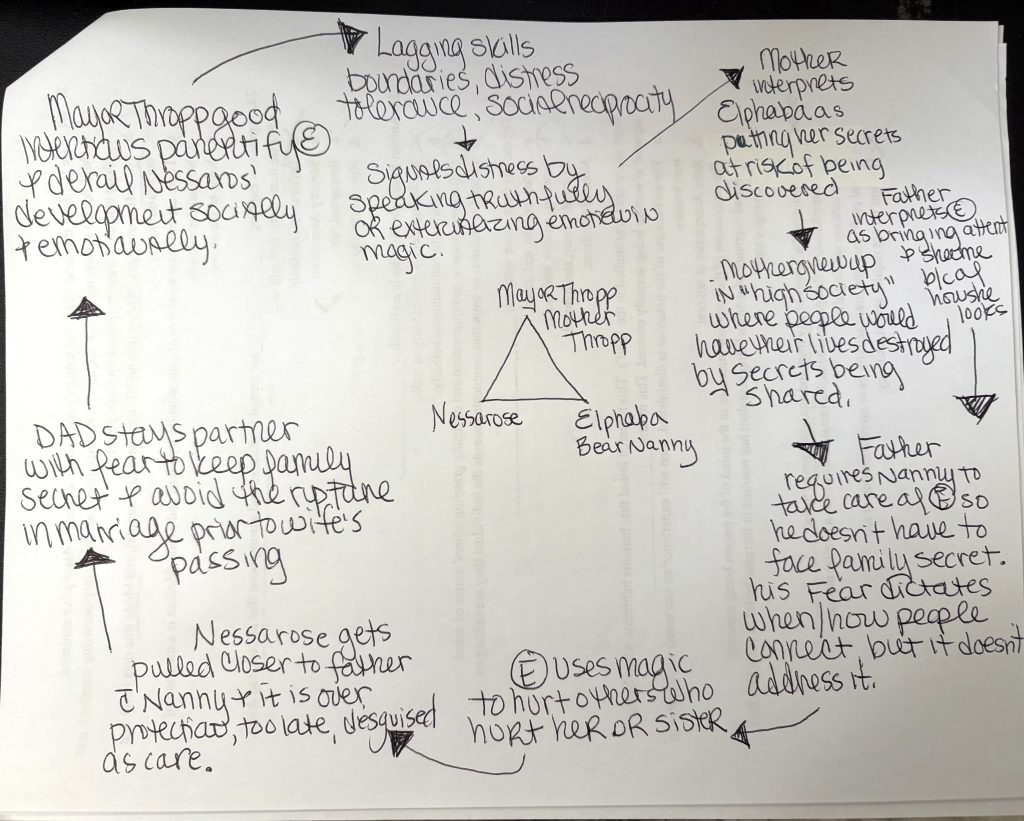Category: Subscribers ONLY
-
The Winner of the Wicked Competition

#image_title As part of our Wicked Competition, participants were invited to apply Ecosystemic Structural Family Therapy (ESFT) concepts to the world of Wicked—and one submission stood out for its clarity, creativity, and clinical precision.
The winning entry mapped the family system using both an ecomap and a Negative Interactional Pattern (NIP). Featured here is the NIP, which places Nessarose, Elphaba, the Bear Nanny, Mayor Thropp, and Mrs. Thropp as part of the triangle.
Rather than focusing on individual pathology, the NIP highlights how each person’s responses are relationally organized and mutually reinforcing. Within this triangle, well-intentioned caregiving, protection, and authority intersect in ways that unintentionally intensify disconnection, over-responsibility, and emotional isolation—particularly for Elphaba and Nessarose.
From an ESFT perspective, the NIP illustrates how:
- Caregiver fear and societal pressure shape parental leadership
- Protective behaviors escalate rather than soothe distress
- Children are pulled into roles that strain attachment and emotion regulation
- The broader ecology (including loss, stigma, and power) amplifies family stress
What made this submission especially strong was its ability to show how everyone is doing the best they can within a system that needs support—not blame. The NIP becomes a roadmap for intervention, pointing clinicians toward strengthening leadership, clarifying roles, and shifting interactional sequences rather than “fixing” a single character.
Congratulations to our Wicked Competition winner for reminding us that even in Oz, behavior makes sense in context—and systems, not individuals, are where change begins.
-
Wicked Characters as Family Systems Metaphors

🌪️ A playful, clinically grounded way to think about family dynamics through the world of Oz
Elphaba — The “Identified Patient” Who Carries the System’s Anxiety
Elphaba represents the youth who is labeled as “the problem” simply because the system doesn’t understand or accommodate their uniqueness.
In ESFT terms, she is the symptom bearer—not because she’s broken, but because her family, community, and social ecology project their fears and failures onto her.
Her journey mirrors the work of helping a child reclaim identity, voice, and relational belonging.
Glinda — The Caregiver Who Uses Performance to Maintain Harmony
Glinda embodies the caregiver (or sibling) who copes through positive affect, charm, and high sociability.
Her role keeps peace but often hides insecurity.
In systemic therapy, she symbolizes the family member whose over-functioning or “performer” role helps stabilize the system—but prevents vulnerability.
Her friendship with Elphaba demonstrates the healing power of authentic connection.
Fiyero — The Avoidant Attachment Partner Afraid to Choose
Fiyero mirrors the person in the system who avoids emotional engagement—“fun,” charming, but disconnected.
He represents a protective adaptation, not a flaw.
Through relationship with both Glinda and Elphaba, he learns the core principles of systemic change:- Responsibility
- Presence
- Emotional risk-taking
The Wizard — The Larger System That Creates the Problem It Claims to Solve
The Wizard symbolizes structural forces—policies, institutions, and leaders—that blame individuals while perpetuating dysfunction.
He is the metaphor for:- Oppressive systems
- Pathologizing narratives
- Blame-shifting structures
In family therapy terms, he is the “macro-system stressor” shaping how families respond to crisis.
Madame Morrible — The Rigid Hierarchy That Reinforces Dysfunction
Morrible represents the family system’s coercive hierarchy—a figure who uses fear, control, and manipulation to maintain order.
Her “weather patterns” metaphorically mirror how emotional climates in families are often shaped by the most powerful or reactive members.
Nessarose — The Child Caught in the Bind of Overprotection
Nessarose is the sibling who receives intense focus—overprotection disguised as care.
Her storyline reflects how enmeshment and over-dependence can limit growth and create resentment, despite good intentions.
Her dynamic with Elphaba shows what happens when families assign fixed roles (“the responsible one,” “the helpless one”).
Boq — The Marginalized Member Who Adapts Until He Breaks
Boq embodies the overlooked, underheard member of the system who tries to earn belonging through compliance.
His unmet needs eventually transform him—literally—revealing how suppressed emotions can reshape functioning.
He is the metaphor for accommodation patterns and role strain.
Dr. Dillamond — The Silenced Voice of Wisdom
Dillamond represents the voice in the system that sees the truth but is ignored or suppressed.
He symbolizes the disenfranchised perspective—the teacher, elder, or natural support whose insight is essential to systemic change, but often marginalized.
Dorothy (Part 2) — The Newcomer Who Exposes Existing Fault Lines
Dorothy is the outsider whose arrival destabilizes a fragile system.
Her presence reveals:- unresolved grief
- fractured alliances
- long-standing injustices
She is the catalyst that forces the system to confront its hidden patterns.
-
November Newsletter 2025

#novembernewsletter #pcfttc #esft #fbmhs Dear Colleagues and Friends,
We’re excited to share this month’s PCFTTC newsletter—packed with insights, resources, and opportunities to support your ongoing professional growth.
Here’s a quick look at what’s inside:
🌀 Tantrums and More Tantrums…
A systemic reframing of what children’s challenging behaviors really communicate—and how ESFT clinicians can use family assessment tools to understand the whole system.⚔️ Wicked Competition
Explore Elphaba through the lens of the family assessment tool and win access to Homestudy of your choice.🎭 “I Feel Like an Imposter!”
A post view of an October workshop on understanding and navigating persistent self-doubt in clinical work and supervision.🎓 Free CE Credits – 11/19/25
Yes, you read that right! Don’t miss out on your chance to earn free CE credits during the training year.We hope this edition brings you reflection, encouragement, and a few new tools to take into your work.
As always, thank you for being part of the PCFTTC community.
Wishing you connection, clarity, and a meaningful month ahead.
